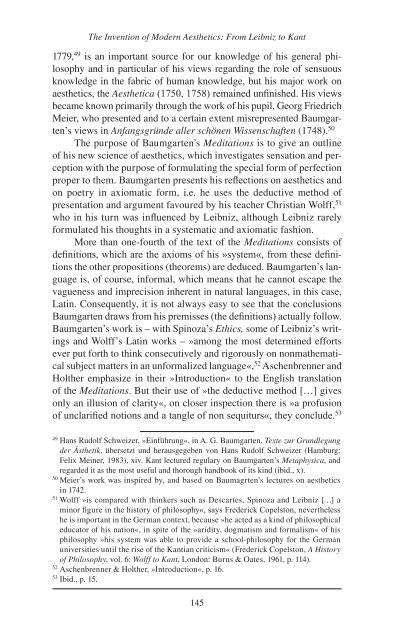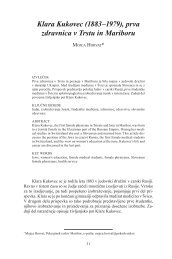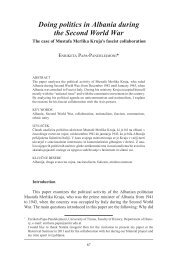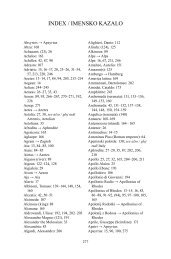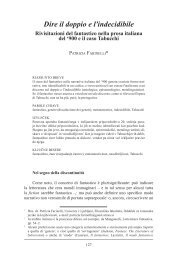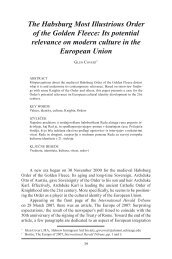The Invention of Modern Aesthetics: From Leibniz to Kant
The Invention of Modern Aesthetics: From Leibniz to Kant
The Invention of Modern Aesthetics: From Leibniz to Kant
You also want an ePaper? Increase the reach of your titles
YUMPU automatically turns print PDFs into web optimized ePapers that Google loves.
<strong>The</strong> <strong>Invention</strong> <strong>of</strong> <strong>Modern</strong> <strong>Aesthetics</strong>: <strong>From</strong> <strong>Leibniz</strong> <strong>to</strong> <strong>Kant</strong><br />
1779, 49 is an important source for our knowledge <strong>of</strong> his general philosophy<br />
and in particular <strong>of</strong> his views regarding the role <strong>of</strong> sensuous<br />
knowledge in the fabric <strong>of</strong> human knowledge, but his major work on<br />
aesthetics, the Aesthetica (1750, 1758) remained uninished. His views<br />
became known primarily through the work <strong>of</strong> his pupil, Georg Friedrich<br />
Meier, who presented and <strong>to</strong> a certain extent misrepresented Baumgarten’s<br />
views in Anfangsgründe aller schönen Wissenschaften (1748). 50<br />
<strong>The</strong> purpose <strong>of</strong> Baumgarten’s Meditations is <strong>to</strong> give an outline<br />
<strong>of</strong> his new science <strong>of</strong> aesthetics, which investigates sensation and perception<br />
with the purpose <strong>of</strong> formulating the special form <strong>of</strong> perfection<br />
proper <strong>to</strong> them. Baumgarten presents his relections on aesthetics and<br />
on poetry in axiomatic form, i.e. he uses the deductive method <strong>of</strong><br />
presentation and argument favoured by his teacher Christian Wolff, 51<br />
who in his turn was inluenced by <strong>Leibniz</strong>, although <strong>Leibniz</strong> rarely<br />
formulated his thoughts in a systematic and axiomatic fashion.<br />
More than one-fourth <strong>of</strong> the text <strong>of</strong> the Meditations consists <strong>of</strong><br />
deinitions, which are the axioms <strong>of</strong> his »system«, from these deinitions<br />
the other propositions (theorems) are deduced. Baumgarten’s language<br />
is, <strong>of</strong> course, informal, which means that he cannot escape the<br />
vagueness and imprecision inherent in natural languages, in this case,<br />
Latin. Consequently, it is not always easy <strong>to</strong> see that the conclusions<br />
Baumgarten draws from his premisses (the deinitions) actually follow.<br />
Baumgarten’s work is – with Spinoza’s Ethics, some <strong>of</strong> <strong>Leibniz</strong>’s writings<br />
and Wolff’s Latin works – »among the most determined efforts<br />
ever put forth <strong>to</strong> think consecutively and rigorously on nonmathematical<br />
subject matters in an unformalized language«, 52 Aschenbrenner and<br />
Holther emphasize in their »Introduction« <strong>to</strong> the English translation<br />
<strong>of</strong> the Meditations. But their use <strong>of</strong> »the deductive method […] gives<br />
only an illusion <strong>of</strong> clarity«, on closer inspection there is »a pr<strong>of</strong>usion<br />
<strong>of</strong> unclariied notions and a tangle <strong>of</strong> non sequiturs«, they conclude. 53<br />
49<br />
Hans Rudolf Schweizer, »Einführung«, in A. G. Baumgarten, Texte zur Grundlegung<br />
der Ästhetik, übersetzt und herausgegeben von Hans Rudolf Schweizer (Hamburg:<br />
Felix Meiner, 1983), xiv. <strong>Kant</strong> lectured regulary on Baumgarten’s Metaphysica, and<br />
regarded it as the most useful and thorough handbook <strong>of</strong> its kind (ibid., x).<br />
50<br />
Meier’s work was inspired by, and based on Baumagrten’s lectures on aesthetics<br />
in 1742.<br />
51<br />
Wolff »is compared with thinkers such as Descartes, Spinoza and <strong>Leibniz</strong> […] a<br />
minor igure in the his<strong>to</strong>ry <strong>of</strong> philosophy«, says Frederick Copels<strong>to</strong>n, nevertheless<br />
he is important in the German context, because »he acted as a kind <strong>of</strong> philosophical<br />
educa<strong>to</strong>r <strong>of</strong> his nation«, in spite <strong>of</strong> the »aridity, dogmatism and formalism« <strong>of</strong> his<br />
philosophy »his system was able <strong>to</strong> provide a school-philosophy for the German<br />
universities until the rise <strong>of</strong> the <strong>Kant</strong>ian criticism« (Frederick Copels<strong>to</strong>n, A His<strong>to</strong>ry<br />
<strong>of</strong> Philosophy, vol. 6: Wolff <strong>to</strong> <strong>Kant</strong>, London: Burns & Oates, 1961, p. 114).<br />
52<br />
Aschenbrenner & Holther, »Introduction«, p. 16.<br />
53<br />
Ibid., p. 15.<br />
145


